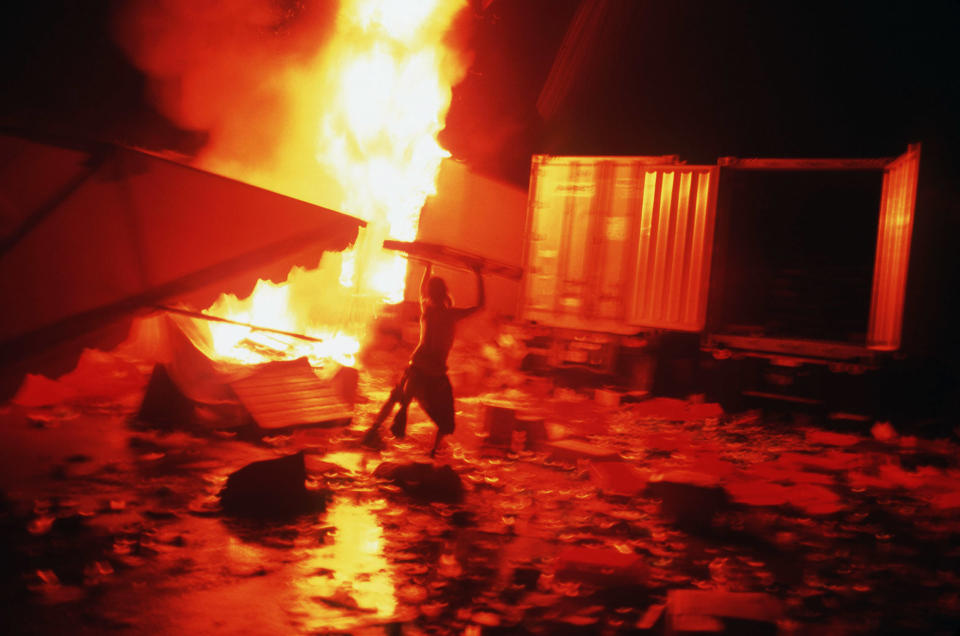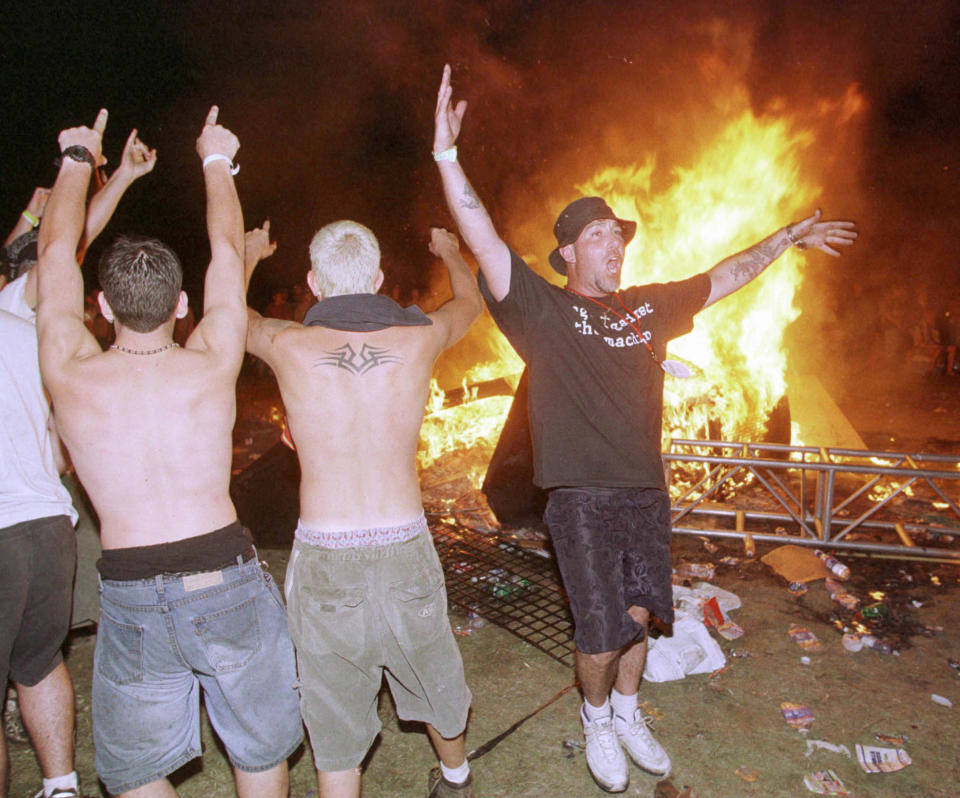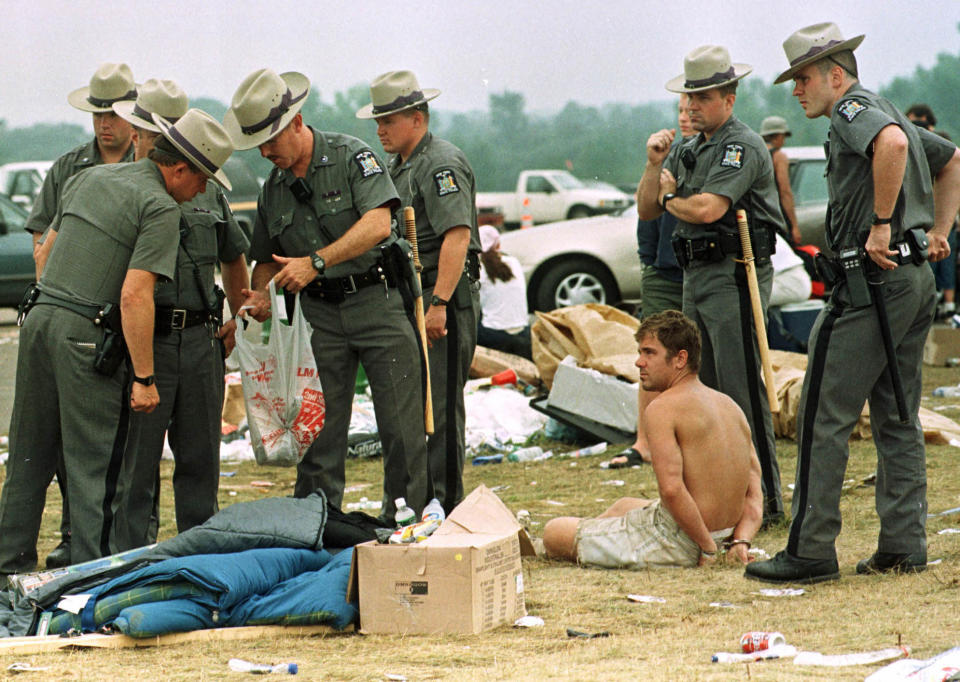When Woodstock '99 riots erupted during Red Hot Chili Peppers' set: 'We looked like we were the bad guys'
- Oops!Something went wrong.Please try again later.
- Oops!Something went wrong.Please try again later.
Twenty years ago, before there was the Fyre Festival, there was fire — literally — at the Woodstock ’99 festival, during closing act the Red Hot Chili Peppers’ controversial set. What had been intended as a celebration of peace and love, in the spirit of the original 1969 event, sadly devolved into violent chaos. Tensions mounted throughout the poorly planned festival, which took place on the scalding tarmac of Rome, New York’s Griffiss Air Force Base July 22-25, 1999, as concertgoers grew grumpy from the overcrowding, overheating, overpriced food and water, and understaffed security.
By the long, hot weekend’s end, there had been 44 arrests, roughly 10,000 fans needing medical treatment, and eight reported cases of sexual assault. The San Francisco Chronicle called it “the day the music died” for the ’90s generation.
“It was dangerous to be around. The whole scene was scary. There were just waves of hatred bouncing around the place,” MTV’s Kurt Loder, who’d been reporting from the scene, later told USA Today. “It was like a concentration camp. To get in, you get frisked to make sure you're not bringing in any water or food that would prevent you from buying from their outrageously priced booths. You wallow around in garbage and human waste. There was a palpable mood of anger.”


A good portion of the media’s post-Woodstock ’99 coverage focused not on the organizers’ logistical failures mentioned by Loder, but on the small percentage of the 400,000 disgruntled attendees who had rioted, pillaged, and looted. But Tom Morello, whose band Rage Against the Machine played the festival, penned an opinion piece for the New York Times placing the blame elsewhere. “Hey man, leave the kids alone. I've had enough of the frenzied demonization of young people surrounding Woodstock ’99,” Morello wrote. “Yes, Woodstock was filled with predators: the degenerate idiots who assaulted those women, the greedy promoters who wrung every cent out of thirsty concertgoers, and last but not least, the predator media that turned a blind eye to real violence and scapegoated the quarter of a million music fans at Woodstock ’99, the vast majority of whom had the time of their lives.”
However, two Woodstock ’99 rock acts also shouldered much of the media’s blame. One was nu-metal band Limp Bizkit, whose frontman Fred Durst told the increasingly aggressive crowd, “I don't think you should mellow out; that's what Alanis Morissette had you motherf***ers do!” and encouraged moshers to go crazy during “Break Stuff” (as seen below). The other band was above-mentioned Sunday headliners the Red Hot Chili Peppers, who picked a pretty unfortunate time to — apparently unironically — cover Jimi Hendrix’s “Fire,” just as actual fires began to break out on the festival grounds. Speaking to Yahoo Entertainment, the Chili Peppers’ drummer, Chad Smith, explains it was all just a big misunderstanding.
Red Hot Chili Peppers had famously played Woodstock ’94 while wearing giant light bulb heads, a sort of initiation gig for their new guitarist, Jane’s Addiction’s Dave Navarro, who had recently replaced the exiting John Frusciante. Smith says Woodstock ’94 “wasn't a really great experience. It didn't have the spirit of the first one, you know. You can't try to replicate that 1969 thing and all the peace and love and all that s***. It was a corporate thing.” But by 1999, Frusciante had returned, and RHCP’s new album, Californication, was massive. “We had this new energy with John being [back] in our band for a year, and that was exciting.” So the Peppers decided to play Woodstock again.

Peppers bassist Flea was so pumped up, in fact, that he decided to play in the buff. “We were getting ready to go on, and back then we there was some nudity involved once in a while, and Flea was like, ‘Just play naked?’ And I'm like, ‘F***, yeah. Go for it. What are they going to do? Carry you off the stage?’” Smith recalls. “So he drops his underwear, whatever he had on, and Flea played the whole set naked. If you're out there for an hour and a half playing, you've got to go for it, and so that added an extra element of gusto, and it was really fun.” (“If you're ever gonna take off your clothes at any gig, it would be Woodstock,” Flea told Larry King years later.)
However, it was another last-minute backstage decision that proved in retrospect to be ill-advised, and not so fun.
“I remember we were getting ready to go on, and they were going to do [a tribute] to [original Woodstock ’69 performer] Jimi Hendrix after we played,” Smith explains. “His sister came to us, and we'd met her before; we'd done some other stuff with the Hendrix Experience. And she said, ‘Hey, I know you guys do Jimi Hendrix songs. What do you think if I could get a Hendrix song before, like as your last song before the tribute thing, you know? It'd be kind of a nice segue.’ And we're like, ‘OK, that sounds cool.’”
The band hadn’t played Hendrix’s “Fire” since 1991, but they “kind of rehearsed it backstage,” with Smith banging out the beat with his drumsticks on a chair, “and that was it.”
The Peppers finally hit the stage on the final night of Woodstock ’99, Sunday, around 8:40 p.m., and some of Smith’s memories of the show are admittedly a little fuzzy, since he had partied hard (and — TMI alert! — indulged in a threesome) the night before. “I was a little hungover when I showed up for the Woodstock thing, though I guess that seems kind of appropriate,” says Smith, who is now married and sober. “But it was all good by the time we were playing.” Smith realizes in hindsight that “after the three days of no water, or $17 bottled waters, and no places to pee and whatever, [the concertgoers] were all pent-up,” but in the moment, from his vantage point, he thought “the set was going good. We're playing our little songs, and everybody seemed to be having a good time.”

Unbeknownst to the band, the anti-violence group PAX, planning to stage an anti-gun vigil during the RHCP’s power ballad “Under the Bridge,” had distributed about 100,000 candles to fans. Unfortunately, that candle-lighting ceremony quickly became very un-peaceful, as angry festivalgoers used the candles to kindle bonfires that blazed out of control. Some of the fires were actually created by burning plywood panels that had been part of the Woodstock Peace Wall.
And the rioting commenced. Cars were flipped over, ATMs and vendor booths were looted, and New York State Troopers and local law enforcement were eventually called in to defuse the violence.



But the Peppers played on. “I noticed, like, far away — and you've got to remember, the place was huge, so it looked like a mile away — was this kind of fire, or something smoking. And it literally looked like a little hamburger stand had a grease fire or something. It looked like nothing from where we were at,” explains Smith. “Towards the end of the set, we get the word that, ‘Hey, the promoter [John Scher] wants to come on and say something, that there's a fire, and they want to put out the fire.’
“So we stopped. [Scher] made an announcement, like, ‘Hey, people, let the firemen come in,’ or something to that effect: ‘Let [the firemen] do their thing.’ And that was kind of it. He didn't tell us not to play, or to stop. It didn't seem like he was really freaking out or anything. It was just kind of like when people say onstage, ‘Hey guys, chill out, take a step back.’ That sort of s*** happens all the time.
“So, [Scher] went offstage and we started playing again, and the fire got a little bit bigger. But, again, it was so far away; to me, from my perspective, it really didn't look like much. I had really no idea. I swear to God, it was really hard to gauge the severity of it.”
And that is why the Peppers didn’t realize it was probably a bad idea — or at least a really bad look — to proceed with their Hendrix cover.
“So it’s toward the end of the set, and we look at each other, and we're like, ‘Should we do the Hendrix song?’ And we're like, ‘Yeah!’” Smith continues. “So we launched into Jimi Hendrix's ‘Fire,’ right? And we're just doing our thing and rocking out, having a great time. Boom! We finished, get offstage, we leave, get out of there before the crowds. And get home, I go to bed.”
Chili Peppers lead singer Anthony Kiedis may have had some idea that the event had taken a grim turn, as he glanced out at the hellscape during the RHCP’s encore and remarked, “Holy s***, it looks like Apocalypse Now out there.” But Smith says he and his bandmates had no idea what was really going on, or how their all-too-prophetic “Fire” performance would be received in that context.
“The next morning, I get up, I'm in the airport, and I'm looking up at CNN or whatever the news that's on the airport television,” Smith recalls. “They're like, ‘Yesterday's Woodstock festival, they had the Dave Matthews Band and Jewel, and it was all really nice. And then… the Red Hot Chili Peppers played, and all hell broke loose!’ And I'm like, ‘What?’ And they show the fires, and I am like, ‘Oh my God. Oh s***.’ We really looked like we were instigating — that we were the bad guys.
“We were merely paying homage to the great Jimi Hendrix. I guess people obviously didn't know that Jimi Hendrix's sister came back and asked us to play that. Could we have picked another Hendrix song? Probably. But that's the one we rehearsed and that we knew. So yeah, I guess the timing of it wasn’t so great.”
Looking back two decades later, Smith seems to hold the same opinion as Tom Morello when it comes to culpability: He doesn’t blame the fans. “Obviously the promoters who were organizing the show didn't really organize it very well. So that, and then you're on your third day of a hot July thing, and you're a young kid, and you're not used to this, maybe you're going to do some squirrely s***. But it wasn't everybody, just a few bad apples.”
Read more from Yahoo Entertainment:
Follow Lyndsey on Facebook, Twitter, Instagram, Amazon, Spotify.
Want daily pop culture news delivered to your inbox? Sign up here for Yahoo Entertainment & Lifestyle’s newsletter.


